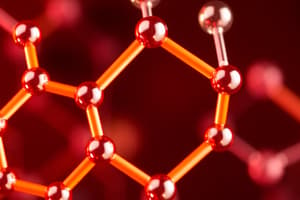Podcast
Questions and Answers
What makes carbon unique in the context of organic chemistry?
What makes carbon unique in the context of organic chemistry?
Why is stereochemistry important in organic chemistry?
Why is stereochemistry important in organic chemistry?
What are functional groups in organic chemistry?
What are functional groups in organic chemistry?
What is the primary focus of inorganic chemistry?
What is the primary focus of inorganic chemistry?
Signup and view all the answers
What do organic chemists study regarding organic reactions?
What do organic chemists study regarding organic reactions?
Signup and view all the answers
What is the main focus of organic chemistry?
What is the main focus of organic chemistry?
Signup and view all the answers
Which type of molecules do inorganic chemists study?
Which type of molecules do inorganic chemists study?
Signup and view all the answers
What are catalysts in the context of inorganic chemistry?
What are catalysts in the context of inorganic chemistry?
Signup and view all the answers
What distinguishes inorganic molecules from organic molecules?
What distinguishes inorganic molecules from organic molecules?
Signup and view all the answers
What types of chemical bonds do inorganic chemists study?
What types of chemical bonds do inorganic chemists study?
Signup and view all the answers
Study Notes
Introduction
Chemistry is a science that studies the composition, properties, and interactions of substances. It is divided into two main branches: organic chemistry and inorganic chemistry. Organic chemistry focuses on the study of carbon-containing compounds, while inorganic chemistry deals with non-carbon-containing compounds.
Organic Chemistry
Organic chemistry is the study of carbon compounds, which are primarily found in living organisms. Carbon is unique because it can form four covalent bonds, allowing for the creation of complex structures. Some key aspects of organic chemistry include:
-
Organic Molecules: These are molecules that contain carbon atoms and are often found in living organisms. They can be simple, like methane (CH4), or complex, like DNA.
-
Functional Groups: Organic molecules often contain functional groups, which are specific arrangements of atoms that give the molecule its properties. Examples include alcohols, carboxylic acids, and ethers.
-
Stereochemistry: This is the study of the three-dimensional arrangement of atoms in organic molecules. It plays a crucial role in understanding the properties and reactions of these molecules.
-
Organic Reactions: Organic chemists study the reactions that organic molecules undergo. These reactions can be used to synthesize new compounds or to modify existing ones.
Inorganic Chemistry
Inorganic chemistry, on the other hand, deals with non-carbon-containing compounds. It includes the study of metals, nonmetals, and their compounds. Some key aspects of inorganic chemistry include:
-
Inorganic Molecules: These are molecules that do not contain carbon atoms. They can be simple, like water (H2O), or complex, like transition metal complexes.
-
Chemical Bonds: Inorganic chemists study the different types of chemical bonds that exist between atoms, such as ionic bonds, covalent bonds, and metallic bonds.
-
Chemical Equilibria: Inorganic chemistry also involves the study of chemical equilibria, which are the balances between reactants and products in a chemical reaction.
-
Catalysis: Inorganic chemists study catalysts, which are substances that accelerate chemical reactions without being consumed in the process.
Conclusion
Chemistry is a fascinating and complex field that encompasses both organic and inorganic subdisciplines. Organic chemistry focuses on carbon-containing compounds, while inorganic chemistry deals with non-carbon-containing compounds. Both branches of chemistry contribute to our understanding of the world around us and have numerous applications in various industries.
Studying That Suits You
Use AI to generate personalized quizzes and flashcards to suit your learning preferences.
Description
This quiz covers the fundamental concepts of organic and inorganic chemistry, including organic molecules, functional groups, stereochemistry, inorganic molecules, chemical bonds, chemical equilibria, and catalysis. It provides an overview of the key aspects of both branches of chemistry and their significance in understanding the composition, properties, and interactions of substances.




